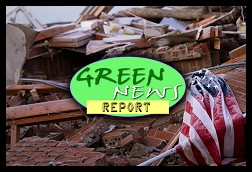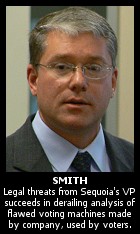Desperate to Stop the Deal, Sequoia's Owners Frantically Seek Funding, Legal Options, All of Which Have so Far Failed Enough to Lead the Judge Working on the Case to Regard One Such Legal Argument as a 'Conspiracy Theory'
Merger of Two Companies Would Likely Create New E-Voting Powerhouse, Face Federal Scrutiny, Come as Surprise to Sequoia's Current Clients...
-- Brad Friedman
 As if Sequoia Voting Systems doesn't have enough trouble already, the company now needs some $2 million dollars in cash...quickly. Without it, it is likely to be subsumed by one of its nearest competitors, Hart InterCivic of Austin, TX, as soon as next Tuesday, The BRAD BLOG has learned.
As if Sequoia Voting Systems doesn't have enough trouble already, the company now needs some $2 million dollars in cash...quickly. Without it, it is likely to be subsumed by one of its nearest competitors, Hart InterCivic of Austin, TX, as soon as next Tuesday, The BRAD BLOG has learned.
In what could well be a major shift on the American election industry landscape --- and certainly on elections themselves in dozens of states across the country --- voting machine company Hart InterCivic informed the current owners of the beleaguered Sequoia of their intention to acquire ownership of the company in a move which could take effect as early as next week.
The attempted hostile takeover --- which, we've learned, has been quietly in the works behind the scenes since mid-February --- has set off a building panic among the senior management and owners at Sequoia, whose money woes had already led them to schedule a shut-down of their Oakland headquarters. That shop is to close within a matter of months, as the operations for the company are to be consolidated at its Denver offices.
The takeover by Hart is made possible in the wake of a deal made by Sequoia's current owners, SVS Holdings, Inc., with its former owners, the off-shore consortium Smartmatic. Smartmatic was forced to give up control of the company after the media and Congress noticed in 2006 that the company had ties to Venezuela's Hugo Chavez. The officers and owners of SVS are comprised largely of previous Sequoia officials who took over the company after Smartmatic's failed attempt to find an outside buyer in 2006. The deal resulted in an agreement between SVS and Smartmatic for the latter to hold a $2 million note from the purchase. Smartmatic now appears ready to sell that note to Hart as part of a $16 million dollar deal which SVS has a contractual right to match within a 60-day period, ending on April 15th.
Sequoia is believed by election experts to be this country's third largest voting machine company, followed by Hart. The combined operation, should the takeover be completed, could well create a new powerhouse in the industry, displacing #2 Diebold/Premier, and coming up just behind the country's currently largest election vendor, ES&S.
Court documents obtained by The BRAD BLOG reveal that Hart notified SVS of its intention to purchase the $2 million note held by Smartmatic on February 15th, giving the group of owners and share holders of SVS --- including CEO and President Jack Blaine, and VPs Michelle Shafer and Edwin Smith (whose names BRAD BLOG readers may recognize) --- just 60 days to match the offer Hart had given to Smartmatic. As the deadline nears, Due Dilligence processes have begun, and are near the final phases of completion at Sequoia...whether company management likes it or not.
Hart's move has sent Sequoia/SVS executives into a legal and financial tizzy and --- perhaps taking a page from Hillary Clinton's campaign book --- the company seems to be throwing the legal kitchen sink at both Hart and Smartmatic in an attempt to nullify Hart's offer. Court documents reveal arguments that Hart's is not a "bona fide" offer that SVS is legally required to match. So far, however, those legal maneuvers, reflected by a dizzying array of motions and cross-motions, suits and counter-suits --- completely unreported by anyone in the media until now --- have all been summarily and soundly rejected by the Delaware magistrate adjudicating the matter.
Every legal effort by Sequoia and SVS to dispatch with the hostile takeover attempt has failed miserably so far, leading Vice Chancellor Stephen P. Lamb of the Court of Chancery in Delaware to even describe one such legal theory of SVS' as...(big irony alert!)...a "conspiracy theory"!
But while Sequoia faces a plethora of legal liabilities concerning their oft-failed voting systems, Hart InterCivic faces its own share of challenges with a pending --- and damning --- federal fraud/qui tam suit against the company, as unsealed late last month. Moreover, Hart's acquisition plan could face scrutiny from members of Congress and Treasury Department officials, as well as states across the country who thought they had turned over control of their elections to Sequoia, only to soon learn there will be a new owner, not of their choosing, of the secret software and devices which determine the results of their public elections.
While litigation over claims of fraud and failure in both company's voting systems await, so does at least one major prize to the victor of this grudge match: New York state's soon-to-be-completed $100 million deal with Sequoia...or maybe now with Hart...or...whoever...
--- Click here for REST OF STORY!... ---
 John Gideon briefly noted what happened in Florida in yesterday's Daily Voting News, but it deserves a bit more attention. A lot more attention, actually.
John Gideon briefly noted what happened in Florida in yesterday's Daily Voting News, but it deserves a bit more attention. A lot more attention, actually.

 'A World of Tyrants,
'A World of Tyrants, 'Green News Report' 5/22/25
'Green News Report' 5/22/25
 'Dangerous Times': Climate Scientist Warns Trump 'Censorship' Endangering Nat'l Security: 'BradCast' 5/21/25
'Dangerous Times': Climate Scientist Warns Trump 'Censorship' Endangering Nat'l Security: 'BradCast' 5/21/25 And Then They Came for Members of Congress...: 'BradCast' 5/20/25
And Then They Came for Members of Congress...: 'BradCast' 5/20/25 'Green News Report' 5/20/25
'Green News Report' 5/20/25 Appeals Court Blocks Last Route for Voters to Challenge Violations of the VRA: 'BradCast' 5/19/25
Appeals Court Blocks Last Route for Voters to Challenge Violations of the VRA: 'BradCast' 5/19/25 Sunday 'Now Hoarding' Toons
Sunday 'Now Hoarding' Toons Mad World:
Mad World: 'Green News Report' 5/15/25
'Green News Report' 5/15/25 Plane Corruption and the Future of the DOJ: 'BradCast' 5/14/25
Plane Corruption and the Future of the DOJ: 'BradCast' 5/14/25 'Deeply Evil': GOP Proposes Largest Medicaid Cuts in History: 'BradCast' 5/13/25
'Deeply Evil': GOP Proposes Largest Medicaid Cuts in History: 'BradCast' 5/13/25 'Green News Report' 5/13/25
'Green News Report' 5/13/25 And Then They Came for the Mayors...: 'BradCast' 5/12/25
And Then They Came for the Mayors...: 'BradCast' 5/12/25 Sunday 'New Guy, Old Guy' Toons
Sunday 'New Guy, Old Guy' Toons Blowing Smoke. At the Vatican and White House: 'BradCast' 5/8/25
Blowing Smoke. At the Vatican and White House: 'BradCast' 5/8/25 'Green News Report' 5/8/25
'Green News Report' 5/8/25 SCOTUS Weighs Public Funding of Religious Schools: 'BradCast' 5/7/25
SCOTUS Weighs Public Funding of Religious Schools: 'BradCast' 5/7/25 Trump Judge Blocks NC GOP Theft of 2024 Supreme Court Seat: 'BradCast' 5/6/25
Trump Judge Blocks NC GOP Theft of 2024 Supreme Court Seat: 'BradCast' 5/6/25 Prosecutors Quit After U.S Attny Strikes Deal With Felon Cop: 'BradCast' 5/5/25
Prosecutors Quit After U.S Attny Strikes Deal With Felon Cop: 'BradCast' 5/5/25 Trump Losing Streak Continues into SECOND Hundred Days: 'BradCast' 5/1/25
Trump Losing Streak Continues into SECOND Hundred Days: 'BradCast' 5/1/25 100 Daze (w/ Digby and Driftglass): 'BradCast' 4/30/25
100 Daze (w/ Digby and Driftglass): 'BradCast' 4/30/25 Campaign to 'Impeach Trump Again' Gains Fresh Momentum: 'BradCast' 4/29/25
Campaign to 'Impeach Trump Again' Gains Fresh Momentum: 'BradCast' 4/29/25 And Then They Came for the Judges...: 'BradCast' 4/28/25
And Then They Came for the Judges...: 'BradCast' 4/28/25 Trump EPA Guts Enviro Justice Office: 'BradCast' 4/24/25
Trump EPA Guts Enviro Justice Office: 'BradCast' 4/24/25
 VA GOP VOTER REG FRAUDSTER OFF HOOK
VA GOP VOTER REG FRAUDSTER OFF HOOK Criminal GOP Voter Registration Fraud Probe Expanding in VA
Criminal GOP Voter Registration Fraud Probe Expanding in VA DOJ PROBE SOUGHT AFTER VA ARREST
DOJ PROBE SOUGHT AFTER VA ARREST Arrest in VA: GOP Voter Reg Scandal Widens
Arrest in VA: GOP Voter Reg Scandal Widens ALL TOGETHER: ROVE, SPROUL, KOCHS, RNC
ALL TOGETHER: ROVE, SPROUL, KOCHS, RNC LATimes: RNC's 'Fired' Sproul Working for Repubs in 'as Many as 30 States'
LATimes: RNC's 'Fired' Sproul Working for Repubs in 'as Many as 30 States' 'Fired' Sproul Group 'Cloned', Still Working for Republicans in At Least 10 States
'Fired' Sproul Group 'Cloned', Still Working for Republicans in At Least 10 States FINALLY: FOX ON GOP REG FRAUD SCANDAL
FINALLY: FOX ON GOP REG FRAUD SCANDAL COLORADO FOLLOWS FLORIDA WITH GOP CRIMINAL INVESTIGATION
COLORADO FOLLOWS FLORIDA WITH GOP CRIMINAL INVESTIGATION CRIMINAL PROBE LAUNCHED INTO GOP VOTER REGISTRATION FRAUD SCANDAL IN FL
CRIMINAL PROBE LAUNCHED INTO GOP VOTER REGISTRATION FRAUD SCANDAL IN FL Brad Breaks PA Photo ID & GOP Registration Fraud Scandal News on Hartmann TV
Brad Breaks PA Photo ID & GOP Registration Fraud Scandal News on Hartmann TV  CAUGHT ON TAPE: COORDINATED NATIONWIDE GOP VOTER REG SCAM
CAUGHT ON TAPE: COORDINATED NATIONWIDE GOP VOTER REG SCAM CRIMINAL ELECTION FRAUD COMPLAINT FILED AGAINST GOP 'FRAUD' FIRM
CRIMINAL ELECTION FRAUD COMPLAINT FILED AGAINST GOP 'FRAUD' FIRM RICK SCOTT GETS ROLLED IN GOP REGISTRATION FRAUD SCANDAL
RICK SCOTT GETS ROLLED IN GOP REGISTRATION FRAUD SCANDAL VIDEO: Brad Breaks GOP Reg Fraud Scandal on Hartmann TV
VIDEO: Brad Breaks GOP Reg Fraud Scandal on Hartmann TV RNC FIRES NATIONAL VOTER REGISTRATION FIRM FOR FRAUD
RNC FIRES NATIONAL VOTER REGISTRATION FIRM FOR FRAUD EXCLUSIVE: Intvw w/ FL Official Who First Discovered GOP Reg Fraud
EXCLUSIVE: Intvw w/ FL Official Who First Discovered GOP Reg Fraud GOP REGISTRATION FRAUD FOUND IN FL
GOP REGISTRATION FRAUD FOUND IN FL



















 Curiouser and curiouser in New Jersey...
Curiouser and curiouser in New Jersey... Faced with extraordinarily bad press concerning her company's
Faced with extraordinarily bad press concerning her company's  As if
As if  Last week, in the wake of their AVC Advantage touch-screen voting systems having been found to have
Last week, in the wake of their AVC Advantage touch-screen voting systems having been found to have  We can't think of a clever enough turn of phrase this morning to adequately cover the full irony here...
We can't think of a clever enough turn of phrase this morning to adequately cover the full irony here...  In a
In a  Sequoia Voting Systems' legal threats against Princeton computer science professors and New Jersey election officials, as
Sequoia Voting Systems' legal threats against Princeton computer science professors and New Jersey election officials, as  -- Brad Friedman
-- Brad Friedman The call by state election officials for the independent study of Sequoia's AVC Advantage touch-screen machines comes in the wake of a recent finding that the
The call by state election officials for the independent study of Sequoia's AVC Advantage touch-screen machines comes in the wake of a recent finding that the 












